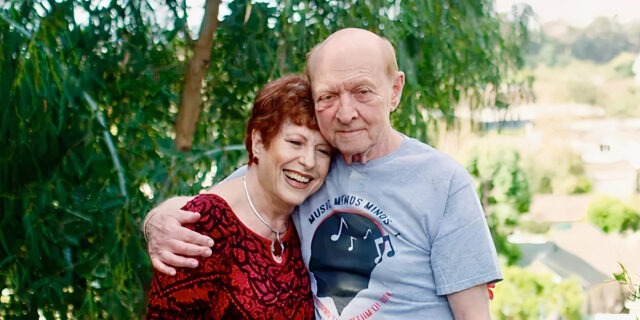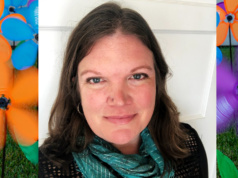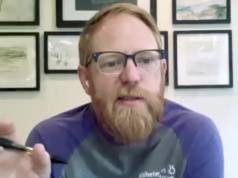– Welcome back, everyone, to Answers for Elders Radio Network. And I am here with the amazing Carol Rosenstein, who is the founder of Music Mends Minds, and it is an organization that harnesses the power of music to help those suffering from diseases like Alzheimer’s, Parkinson’s, traumatic brain injury stroke PTSD, you name it. Carol, I have my own personal story about how music has been such a big part of my life. Some of my listeners may not know, that I was a voice major in college and I sang for community choir. And I was singing for a community choir, back when I was you know, just had lost my father and all of a sudden, I stopped going to practices because I just was frozen. I had lost the you know, the patriarch of my life, right and um anyway, the choir came together and basically helped heal my grief. Certainly we all suffer grief, but I know the power of music and what it can do for those that are hurting or depressed or lonely or even just dealing with challenges with the brain. And we’re so honored to have you here with us. So Carol, Um, I love hearing your story from the last segment.
– Well, thank you, And so he is more information that will truly rivet you. It goes like this. There are two main things that I want to bring your attention to. There are cells in our brains that are to do with music storage memory, so it’s memory storage. Those cells are generated when a fetus in utero is six months old. They’re already hearing a lullaby of “Twinkle Twinkle Little Star” being played in mommy’s bedroom, and their cells are being birthed as a ingestation at six months old. Music therapy shows therapists show, research shows, that the lullabies that they heard are recognized once they’re full born. So that’s one of the important takeaways.
– The second thing is, that truly startled me. We’ve all been to the pharmacist to pick up our medications. We see shelves and rows of colored bottles with magical responses. Our brains have our pharmacy right in here, in our heads. And music happens to be one of the catalysts, the triggers that can go into our own brain’s pharmacy and excite what is comparable to a bottle on the shelf over here, to release a chemical called a neurotransmitter, or is it a bottle over there that’s going to have another chemical released. These neurotransmitters are the chemicals that bring about the reactions that we have in life. So music is a catalyst to go into that pharmacy and choose the right gland that would be responsible for releasing that same neurotransmitter that bring us to a point that may be as powerful as this. A Parkinson patient, they have dopamine deficiency. That’s the bottle over here, storehouse in our brain. Music excites that chemical. It happens to be dopamine that flushes into our system and a Parkinsonian walks better, thinks better, talks better, feels better, and that is the catalyst that made my darling Owen as a wet noodle at sitting at the piano, collapsed, and become a dry noodle. His dopamine cells in his own brain were triggered, and he responded within that window of time as if it had taken a medication, which we know was the cause of his side effect, that took him down because of the hallucinations and the agitation. So it’s back to synthetic or original. And the music triggers the original dopamine. And I can list you a list of neurotransmitters that are doing the same thing released by music. The complexity of music. Now, of course, I’m saying somebody sitting clapping to a melody, or tapping to a melody, has the same trigger in the brain like somebody sitting at a piano. There’s music, there’s notes, there’s pedals, there’s harmonics, and so the intensity of the music making has the most important effect on how much of that chemical is going to be released into the system.
– But the overall picture, music is medicine for the mind, because of the mechanism that I discuss.
– Well, and it’s so interesting, Carol, the things that you bring up. Because one of the amazing breakthrough is that I think a lot of our dementia providers out there are really exploring much more so is music therapy. I know people right now, there’s actually degrees out there in music therapy because it’s so important and certainly learning about the power of the recognition like I’ve seen it with my own eyes if when I go into a care community and there’s certain outside stimulus, things that reach those that are suffering from Alzheimer’s or dementia or Parkinson’s or something like that, and that you know where they sit at the piano or there’s the other side of it. Animal therapy do does a similar thing that they’ll come alive in certain cases. But you know, the thing that I think is really amazing about this when we when we hear about it is there’s so much in the way you talked in the very beginning about movement as well. I think being a part of music, it allows the body to start moving, whether it’s dancing or swaying, or moving your hands, or whatever that is going on, or plain balance. So that’s a part of it, I’m sure as well, is it not?
– Absolutely, it’s in that dopamine neurotransmitter that is allowing the physicality, because we can see with Parkinson’s especially the gait is tight, the gait is restricted, the balance is upset, the thinking process is skewed, and there’s just a change in a vital human being to be almost nothing, to feed that chemical flashed by our own brains into our bloodstream and in minutes see them revive and become normal. It’s mind blowing it is.
– And certainly to have an opportunity to meet you, because learning a little bit about what you have accomplished with your organization and how many seniors that you’ve reached, and how creative you are that to keep going through a pandemic where nobody could get together. I’m looking forward to exploring that as we talk today. But I guess I’m going to ask, you’ve learned all this information and you developed this amazing program. What inspires you most to keep going on a program like this?
– I think it really was my personal story, because we don’t only administered to the patients. How about the caregiver? The caregiver here, “I am the rock beloved, and I’m going down with the ship.” And the music is the medicine for me too. And our failure is that has thrown their hands up in despair — There is no cure. What are we gonna do for daddy? What we’re gonna do for mommy? What are we just going to do for the society? — Because Suzanne, every three seconds, somebody’s being diagnosed with dementia, every 65 seconds, somebody with Alzheimer’s, every five minutes somebody with Parkinson’s. I mean, we’re on a pandemic parallel pathway that COVID took us on, and we have vaccines for COVID and we don’t have anything for our neurodegenerative diseases. And so we’re in a pandemic, and we can show that music helps to stabilize us all.
– Yes, and what are you finding are the lasting effects? Like after someone is it has experienced participating in music, do youth is their mind? Does it does it help to lift them up for a period of time? What do you find usually happen?
– We see people hobbling in for an in-person event, or I might say to everyone out there, we have a free, fun, and therapeutic Zoom platform, with a certified music therapist. Three times a week we go out globally and what we see: somebody shows up in a very forlorn face. The music starts, you watch them open their eyes, just like those people in their dementia facility, and by the end of an hour they are laughing. Some of them who even speak, will try to talk, and find the courage to talk. But the general change in the overall individual at the end of the music session is from forlorn to happy. Everyone is unique, but I know that everyone’s counting down how many hours? How many days to the next musical event.
– That’s awesome, So Carol, how do we reach you?
– We have an email that goes directly to me, info@musicmendsminds.org/. We have a phone number that’s joined my hip, (818) 326-0500, and Suzanne, we even have a donate button in cases feels philanthropic to give us a little donation to keep us growing at https://www.musicmendsminds.org/.
– We’re excited to explore this conversation a little bit more. I’m with all of you, and Carol and I are going to be right back right after this.











